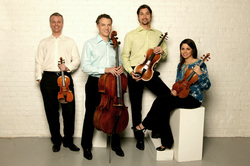 The Pacifica Quartet.
The Pacifica Quartet. Last week, the college-town of Bloomington, Ind., shivered in record low temperatures. But the frigid weather didn’t stop the Pacifica Quartet – the string quartet in residence on the sprawling Indiana University campus – from rehearsing for their upcoming concert in Houston.
January marks the beginning of the Pacifica Quartet’s 20th year together. Prestigious prizes in the ensemble’s first decade – the Naumberg Chamber Music Award in 1998 and the Cleveland Quartet Award in 2002 – established them as a top-tier chamber ensemble.
Today, the quartet has played in just about every state, with international tours to Europe, the Far East and Australia. The group also has a dozen CDs to its credit, including a recent four-disc set of Shostakovich’s complete string quartets.
Violinist Sibbi Bernhardsson, a 41-year-old native of Iceland, took a break from rehearsal to talk about a life dedicated to performing in a string quartet.
Q: Chamber music is often called “an equal music,” the idea being that every musician is equally important. Yet in another sense, chamber music is very unequal – the field is dominated by string quartets. Why is the string quartet the most prominent of chamber ensembles?
A: I think the repertoire is the reason – it’s very intimate and expressive. When composers are at their most personal, they tend to write string quartets. Beethoven, Mozart, Bartók, Shostakovich – they all wrote very personal quartets. But the string quartet can also be experimental. It’s easier for a composer to experiment with four musicians than with an entire orchestra. This is one reason why it’s still an evolving form. Composers still want to write for sting quartets.
Q: Like most professional quartets these days, you’re based at a college. What is it like teaching at Indiana University?
A: We all teach individual lessons and oversee the string program here. We each have a certain number of teaching hours, but the school wants us to maintain a robust touring schedule, representing Indiana University around the world. It takes a lot of planning. We’ll go overseas in the summer, or during spring break, so it doesn’t interfere with our teaching.
Fortunately, the flexibility of our work helps us maintain our touring schedule – and it shows the students what it’s like to be a professional musician. It’s not a 9-to-5 job.
Q: With all the talk of classical music’s decline these days, do you think it’s a good career choice for your students?
A: My mother, who’s 80, says she can remember everyone saying that classical music was dying when she was young. But it never does! And it’s amazing how many places in America have chamber-music series. Not just big cities, but also smaller communities: Joplin, Mo., has a chamber series with 400 subscribers, and there’s also a thriving series in Ashland, Ore.
Also, string quartets play in a wide range of venues. We’ve played in prisons, in retirement communities and in inner-city schools in Detroit. This wasn’t expected 20 years ago – but today string quartets do the whole gamut, and the chamber-music field is doing pretty well because of it.
Q: What are the biggest challenges of playing in a string quartet?
A: You form intense relationships with the other players – both personal and musical – so the chemistry has to be right. And you have to be passionate and convinced about your ideas, yet also flexible. We don’t vote on things, and we don’t compromise. We must always find a consensus.
For a young quartet, it can be discouraging, because it takes awhile to sound any good. Even if you have great players who love each other’s playing, there can still be a missing ingredient. I remember in our early days, we talked to the Tokyo Quartet, and they said that just staying together is 90 percent of the work. But if you get past the hump, it’s a very rich life.
Q: You’re playing a Shostakovich quartet on your upcoming concert in Houston. And you recently recorded all the Shostakovich quartets – what was that like?
A: As a group, we like to delve into the mind of a great genius. If you study a composer’s complete body of work, you can make educated decisions about what every dot on the page means. The 15 quartets of Shostakovich are his most personal work. As a friend of mine once said, “Hearing one of his quartets is almost like a visit with a shrink!”
© Colin Eatock 2014
 RSS Feed
RSS Feed

